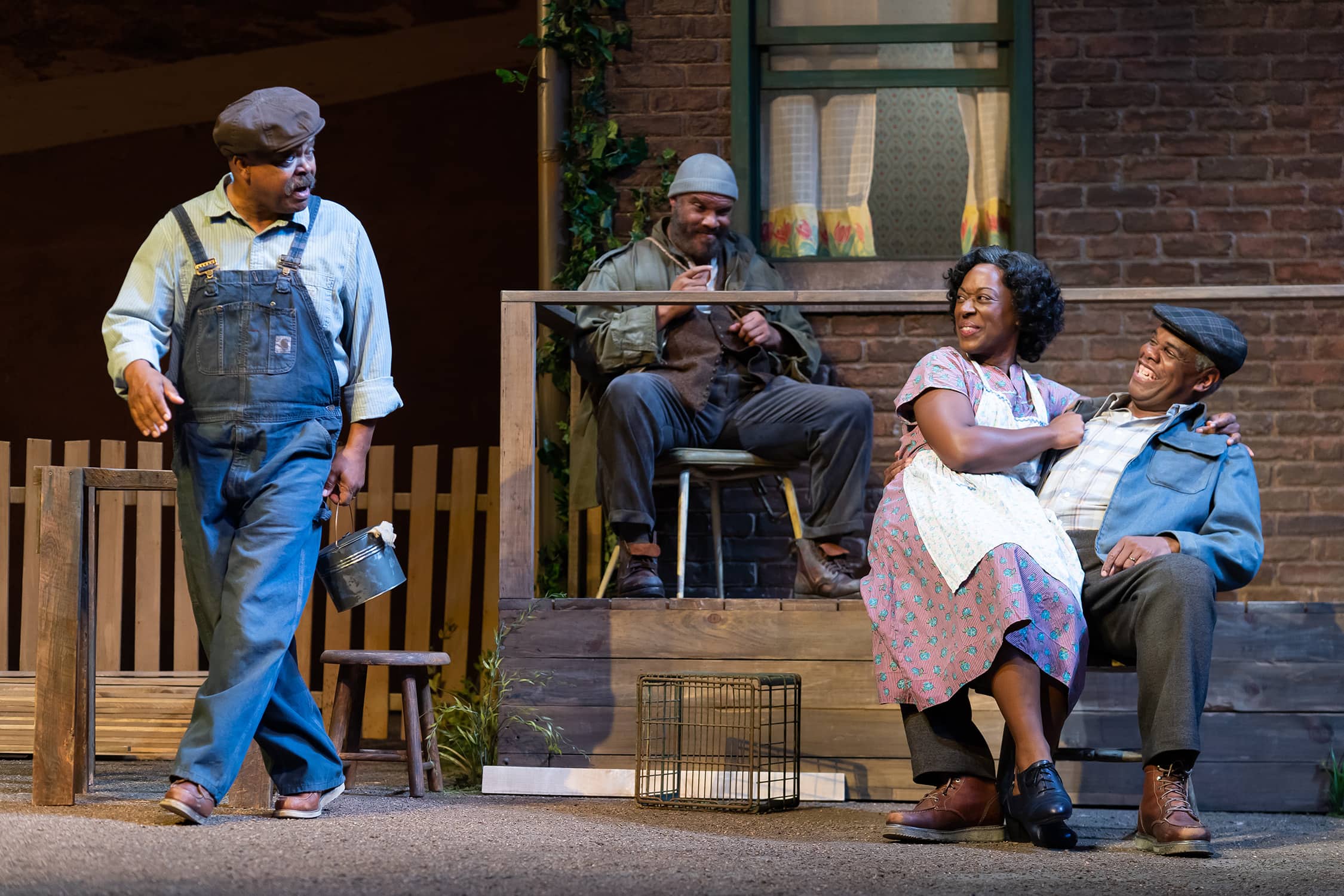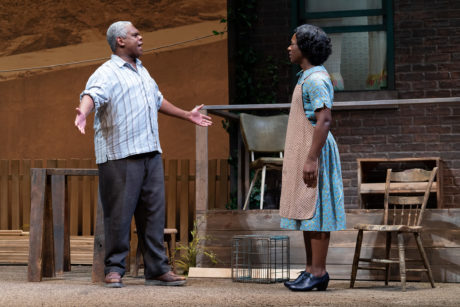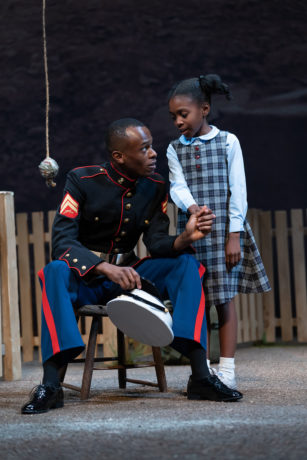As seen through the simple symbolism of a wooden fence, Ford’s Theatre’s season opener of August Wilson’s Fences is a brilliant and searing exploration of the tragi-conflicts and heroic triumphs of the African American experience – and a tour de force of powerhouse performances of soaring emotional timbre.

The sixth in August Wilson’s 10-play series known as the Pittsburgh Cycle or Century Cycle covering 100 years of African American life, Fences is perhaps Wilson’s most popular. It debuted in 1985 and has been performed on Broadway, in national and international regional and community theaters, receiving just about every award a play, playwright, or its performers can merit, and made into an Oscar-winning film starring Denzel Washington and Viola Davis. And it seems that Fences’ popularity just keeps growing.
Ford’s Theatre should be proud to have an ensemble of luminary local actors with a long list of their own awards, including veteran actor Craig Wallace and Helen Hayes awardee Erika Rose, perform Fences. Top that with Timothy Douglas, who has directed nine of Wilson’s Century Cycle, and you have the makings of an unforgettable evening of the best of American theater.
It’s 1957, right before the Civil Rights movement, and Black folks in inner-city Pittsburgh are still dreamin’ but steamin’ mad about racial injustice, discrimination and unequal access to the American Dream.
Troy Maxson’s dreams have gone from deferred to despair as he laments the life he could have had as one of the best ballplayers in the Negro Leagues. Troy aged out for the Big Leagues, and combined with racism in organized sports, lost his way out of the economically depressed life most African Americans were living at the time.
Large and in charge physically and emotionally, Craig Wallace channels the spirit of Willy Loman right into the soul of Troy Maxson, Fences’ main character. Matter of fact, two seasons ago, Wallace had a turn as the down-on-his-luck salesman. In Fences, however, he batters-up to send Death reeling with a fastball in an award-worthy, power pitcher performance as Troy Maxson.
He’s a 53-year-old garbage collector who did manage, however, to challenge the white bosses to promote him to truck driver. But bitterness has already taken root and Troy’s disappointments in life manifest in the way he treats his family, his friends, and also in the way he treats himself.

As Rose, Troy’s patiently kind and compassionate wife, Erika Rose is the antagonist foil to the overbearing Troy. She stands up to him and her loving sense of duty and responsibility to her family matches Troy’s – but without needing the same egoistic payoff. Erika Rose gives a star’s performance as the longsuffering Rose whose subservience to Troy belies the strength of her own convictions.
There are so many dramatic themes in Fences — not so much in plot — that give it richness. Jewels of human experience explore the spectrum of human duality: duty vs. irresponsibility; betrayal vs. loyalty; brutality vs. compassion; selfishness vs. generosity; bitterness vs. forgiveness; and hypocrisy vs. truth, brought to life through a cast of seven vulnerable but resilient characters. Each character portrays every emotional aspect of this spectrum, and each has a pivotal moment in which to shine their light.
Relationships and character development are central in all of August Wilson’s plays and reflective in Fences through:
— Troy’s friendship with Jim Bono (delightfully played with earnest comic relief by the very likable Doug Brown);
— Troy’s strained father-son tensions with adult son Lyons (with the powerful KenYatta Rogers as the nervously edgy, would-be jazz musician who always has his hands in Troy’s pocket);
— Gabriel, the wounded war vet who’s in and out of the psych ward but fights off Hell Hounds and sounds his trumpet to open the Pearly Gates as Troy’s mentally ill but Wise-Fool brother (Jefferson A. Russell gives a lovingly crazed, standout performance);
— Cory, Troy’s younger son and would-be football player who runs smack dab into Troy’s fears and limited hope in the future (believably portrayed by Helen Hayes awardee, Justin Weaks, with an appealing youthful charm but manly confidence);

— Raynell, a six-year-old lovechild who finds refuge in the Maxson home despite the loss of her mother at birth (the adorable, scene-stealing Mecca Rogers got us at “Hi”).
A fine ensemble of talented actors build emotional fences and mend them in engaging connections of love that open to a deeper understanding of the power of family.
The set for Fences is described in the program by Scenic Designer Lauren Helpern as “.. a mix of naturalism and theatricality…almost voyeuristic – with the house and tree close to the audience – yet also grand with the backdrop of Pittsburgh’s Hill District soaring upward and surrounding the space.”
Helpern’s strange “grand” set of a rundown row home and yard sitting at the far edge of a huge sepia-toned photographed background appears to be an isolated, crumbling construction site of urban renewal underway–or perhaps a gravelly symbol of Troy Maxson’s deteriorating relationships. Your call.
Fences is not meant to be a feel-good play. But the emotional depth of its characters, its strong relatability, and its triumphantly hopeful musings make Fences a deeply moving wellspring of human experience that we can all identify with and deeply embrace.
Running Time: Two hours and 45 minutes, plus a 15-minute intermission.
Fences plays through October 27, 2019, at Ford’s Theatre – 511 10th Street NW, Washington, DC. For tickets, call (888) 616-0270 or go online.
Costume Design, Helen Huang; Lighting Design, Andrew R. Cissna; Sound Design, Nick Hernandez; Hair & Makeup Design, Danna Rosedahl; Fight Choreographer, Casey Kaleba; Dialects and Voice Director, Leigh Wilson Smiley; Production Stage Manager, Brandon Prendergast; Assistant Stage Manager, Julia Singer




